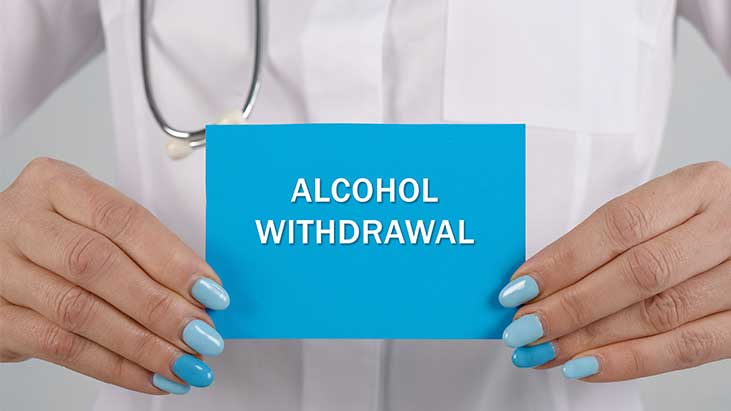Alcohol Withdrawal | Symptoms, Timeline, & Treatment

Medically Reviewed By: Kimberly Langdon, M.D.
Alcohol withdrawal can lead to mild or life-threatening symptoms, including seizures and delirium tremens, that may require urgent treatment. Withdrawal symptoms can occur as soon as eight hours after your last drink, and may persist for up to several weeks.

Alcohol is a central nervous system (CNS) depressant. When abused, alcohol can lead to severe withdrawal symptoms if the substance use has abruptly stopped. In addition to this, there are a number of side effects of alcohol one may experience.
A person may develop alcohol withdrawal syndrome if they have alcohol dependence. Drinking alcohol allows one to feel a sense of relaxation and euphoria due to the brain producing more of the neurotransmitter gamma-aminobutyric acid (GABA).
Excessive alcohol consumption can lead to a number of health conditions including life-threatening symptoms caused by alcohol withdrawal.
Alcohol Withdrawal Symptoms
Withdrawal can range from mild symptoms to severe symptoms depending on a number of factors. If you believe you are developing withdrawal symptoms, contact your Ohio doctor right away.
Mild Withdrawal Symptoms
According to the National Institutes of Health (NIH), some of the mild symptoms a person may experience when suffering from alcohol withdrawal include:
- high blood pressure
- anxiety
- headache
- depression
- palpitations
- stomach cramps
- mood swings
- jumpiness
- hand tremors
- irritability
- sweating
- loss of appetite
- dilated pupils
Alcohol Withdrawal Syndrome
Severe withdrawal symptoms can take place if a person develops alcohol withdrawal syndrome.
Some of the symptoms of alcohol withdrawal syndrome may consist of:
- hallucinations
- cardiovascular problems
- sleeping difficulties
- anxiety
- depression
- withdrawal seizures
- withdrawal delirium
Electrolyte abnormalities may occur due to the weakened immune system of the person participating in alcohol abuse. Other symptoms of withdrawal include dehydration and malnutrition, both contributing to a weakened immune system.
Delirium Tremens (DTs)
Withdrawal delirium, or delirium tremens (DTs), is a severe form of alcohol withdrawal that causes imbalances in brain receptors and neurotransmitters including GABA.
This form of withdrawal delirium is dangerous and can result in the following symptoms:
- tactile or auditory hallucinations
- seizures
- vitamin thiamine deficiency
- hypertension
- disorientation
- nausea
- hypersensitivity to noises
- fluctuations in heart rate
- fluctuations in blood pressure
According to the Substance Abuse and Mental Health Services Administration (SAMHSA), delirium tremens can be potentially fatal due to the severity of the seizures and other side effects.
Timeline Of Alcohol Withdrawal
If you’re a drinker in Ohio, consider the fact that once alcohol levels are lowered in the brain, withdrawal symptoms can begin. Those who are dependent on alcohol and abruptly stop their alcohol intake can experience withdrawal symptoms as quickly as 8 hours after the last drink.
Once a person begins experiencing alcohol withdrawal symptoms, they may be mild at first, but they increase in severity.
Depending on the drinking habits of the person struggling with alcohol use, someone who participates in heavy drinking or binge drinking may develop more serious symptoms.
Likewise, those who have a history of chronic alcohol abuse may suffer from life-threatening withdrawal symptoms which can develop, including delirium tremens and alcohol withdrawal syndrome.
Treatment Of Alcohol Withdrawal
To assist those struggling with alcohol use disorder, various forms of treatment must take place. While some may attempt family interventions, medical interventions may also be necessary.
Treatment centers across Ohio provide inpatient and outpatient options that allow those suffering from alcohol withdrawal to choose the care they want to receive.
Alcohol Detox
One of the first stages in the management of alcohol withdrawal symptoms is the detoxification process. Through detox, the unwanted toxins and harmful substances caused by drug abuse can exit your body.
Medical detox programs for alcohol withdrawal include supervision from a clinician who can monitor your medical condition. This process only lasts short-term but is a necessary first step.
Medication
Another form of withdrawal management includes the use of various medications. Benzodiazepines may be safely administered during a detox program, including:
- lorazepam (Ativan)
- chlordiazepoxide (Librium)
- oxazepam (Serax)
- diazepam (Valium)
Other medications that may be helpful in treatment include anticonvulsants and magnesium sulfate.
Ask for the medical advice of your healthcare provider before taking any of these medications.
Support Groups
Throughout the Ohio area, there are a variety of support groups you can find that offer 12-step programs, specific group counseling, and other forms of support.
If you or a loved one live with alcohol addiction, Ohio Recovery Center can help.
In our inpatient treatment program, we provide behavioral therapies, medical detox, medication-assisted treatment, and other evidence-based recovery services. To learn more, please contact us today.
- Acta Neurologica Scandinavica — Alcohol withdrawal syndrome: mechanisms, manifestations, and management https://www.ncbi.nlm.nih.gov/pmc/articles/PMC6084325/
- Alcohol Health and Research World — Introduction to Alcohol Withdrawal https://www.ncbi.nlm.nih.gov/pmc/articles/PMC6761824/
- National Library of Medicine: MedlinePlus — Alcohol Withdrawal https://medlineplus.gov/ency/article/000764.htm
- National Library of Medicine: StatPearls — Alcohol Withdrawal https://www.ncbi.nlm.nih.gov/books/NBK441882/
- Substance Abuse and Mental Health Services Administration (SAMHSA) — Detoxification and Substance Abuse Treatment https://store.samhsa.gov/sites/default/files/d7/priv/sma15-4131.pdf

